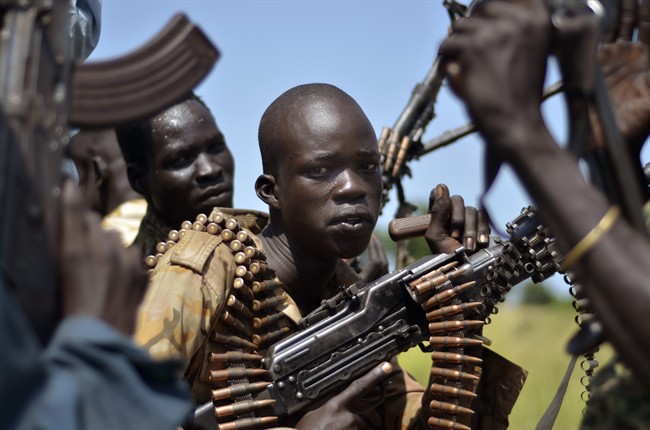JUBA, South Sudan – President Barack Obama has issued waivers that continue U.S. military assistance for troubled South Sudan and six other nations where child soldiers have been used, disappointing advocates who say his administration hasn’t made curbing the use of children in combat a higher priority.

The waivers circumvent parts of the 2008 Child Soldiers Prevention Act, which is meant to block certain kinds of military assistance.
Waivers also have been granted to Somalia, Congo, Nigeria, Rwanda, Iraq and Myanmar. Aid to the countries varies dramatically. Iraq has received hundreds of millions in military support annually, while Myanmar received no military assistance in past years.
READ MORE: ISIS could be building army of up to 100,000 child soldiers
South Sudan’s waiver stands out. The use of child soldiers is rampant in this East African country, where civil war erupted in late 2013 and fighting continues despite a peace deal.
The United Nations says around 16,000 child soldiers have been recruited since the civil war began.
One senior politician appointed by South Sudan President Salva Kiir led the recruitment of an entire village of boys as young as 12 using intimidation in August, according to an internal U.N. document obtained by The Associated Press. The AP also has spoken to teens who said they took up arms.
READ MORE: Over one million refugees have fled South Sudan, says UN
A U.N. official told the AP that both South Sudan’s government and opposition have recruited “hundreds” of children in the past month as the country prepares for another fighting season, even after diplomats from the U.N. Security Council made the issue a high priority during their visit to the country in September. The official spoke on the condition of anonymity because they were not authorized to speak to reporters.
The United States defended the use of the waivers.
“The United States can use the possibility of a waiver to provide an incentive for reform while continuing to work closely with those governments to end the use and recruitment of child soldiers,” said Emily Horne, a spokeswoman for the White House’s National Security Council.
The waivers Obama issued allowed military training and peacekeeping support to continue for South Sudan as well as Congo, Rwanda and Somalia, Horne said.
WATCH: Ex-child soldier now helping Vancouver addicts

In Congo, the Obama administration previously was able to coerce the government to stop the use of child soldiers by threatening to shut off military training, Jo Becker, the advocacy director of Human Rights Watch’s children’s rights division, said in an interview.
But Obama could have been more aggressive in curbing child soldiers during his tenure, she said.
Human Rights Watch has said the waivers have allowed governments that use child soldiers to receive hundreds of millions of dollars in U.S. military aid.
READ MORE: South Sudan – A look back at what brought the country to the brink of civil war
“South Sudan really stands out in terms of the severity of the problem,” Becker said, saying the administration’s exemptions to the country could have been more targeted. The country’s use of child soldiers has “clearly gotten worse” and has “been a complete disaster,” she said.
Of the 10 countries listed by the State Department this year as being implicated in the use of child soldiers, only Sudan, Syria and Yemen did not receive waivers. Becker said the three countries were unlikely candidates for large military assistance anyway.



Comments